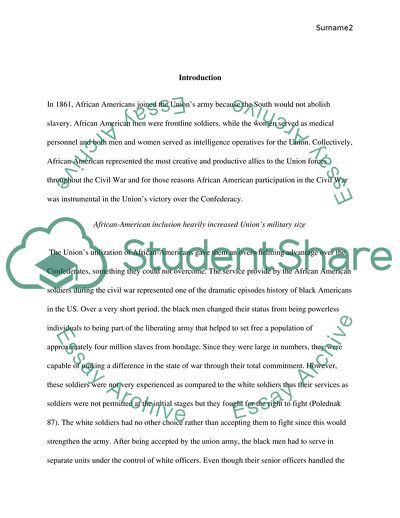Cite this document
(The African Americans and the Unions Army Research Paper Example | Topics and Well Written Essays - 4000 words - 1, n.d.)
The African Americans and the Unions Army Research Paper Example | Topics and Well Written Essays - 4000 words - 1. https://studentshare.org/history/1791507-to-what-extent-was-the-participation-of-african-americans-instrumental-in-the-victory-of-the-union-over-the-confederacy-from-1861-to-1865
The African Americans and the Unions Army Research Paper Example | Topics and Well Written Essays - 4000 words - 1. https://studentshare.org/history/1791507-to-what-extent-was-the-participation-of-african-americans-instrumental-in-the-victory-of-the-union-over-the-confederacy-from-1861-to-1865
(The African Americans and the Unions Army Research Paper Example | Topics and Well Written Essays - 4000 Words - 1)
The African Americans and the Unions Army Research Paper Example | Topics and Well Written Essays - 4000 Words - 1. https://studentshare.org/history/1791507-to-what-extent-was-the-participation-of-african-americans-instrumental-in-the-victory-of-the-union-over-the-confederacy-from-1861-to-1865.
The African Americans and the Unions Army Research Paper Example | Topics and Well Written Essays - 4000 Words - 1. https://studentshare.org/history/1791507-to-what-extent-was-the-participation-of-african-americans-instrumental-in-the-victory-of-the-union-over-the-confederacy-from-1861-to-1865.
“The African Americans and the Unions Army Research Paper Example | Topics and Well Written Essays - 4000 Words - 1”. https://studentshare.org/history/1791507-to-what-extent-was-the-participation-of-african-americans-instrumental-in-the-victory-of-the-union-over-the-confederacy-from-1861-to-1865.


